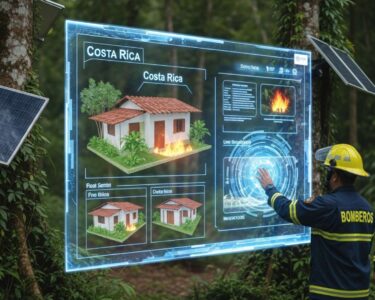San José, Costa Rica — A recent court ruling has revealed a significant delay in Costa Rica’s 5G implementation, attributed to a legal challenge by the ICE workers’ union, Frente Interno de Trabajadores (FIT). The dispute centers around a now-voided public tender for the development of the 5G network, originally announced by ICE and its kölbi brand on July 30th.
The FIT’s legal action aimed to overturn the government’s decree restricting participation in the tender to countries adhering to the Budapest Convention on Cybercrime. While the union’s challenge ultimately failed to achieve this goal, the resulting injunction forced the ICE to declare the initial tender void, causing a substantial setback for the 5G project. The Administrative Contentious Appeals Court acknowledged this delay, highlighting its implications for Costa Rica’s technological advancement.
To understand the legal implications of the ongoing 5G deployment, TicosLand.com spoke with Lic. Larry Hans Arroyo Vargas, an attorney at Bufete de Costa Rica, specializing in telecommunications law.
The rapid deployment of 5G networks in Costa Rica presents exciting opportunities but also complex legal challenges. Ensuring fair competition among providers, managing spectrum allocation efficiently, and safeguarding consumer data privacy are crucial for fostering innovation while protecting the public interest. Regulatory frameworks must adapt to the technological advancements of 5G to effectively address these evolving legal landscapes.
Lic. Larry Hans Arroyo Vargas, Attorney at Law, Bufete de Costa Rica
Lic. Arroyo Vargas rightly highlights the delicate balancing act Costa Rica faces in embracing 5G’s potential while navigating its legal complexities. This rapid technological advancement requires a proactive and adaptive regulatory approach to ensure both innovation and consumer protection thrive in this new digital era. We thank Lic. Larry Hans Arroyo Vargas for offering his valuable perspective on this critical issue.
The impact of the action materialized in the delay caused to the 5G implementation process by the Institute. Any action that attacks the route traced by the Administration for the full deployment of 5G technology directly affects the well-being of our companies, the opportunity to bring quality services to customers, and the position in the telecommunications market.
ICE, Official Statement
The stalled tender process involved Open Radio Access Network (Open RAN) technology, a key element of ICE’s strategy to enhance its competitiveness in the mobile market. Open RAN’s open and disaggregated architecture promises greater flexibility and integration with future technologies, positioning kölbi for long-term growth.
The contest reaffirms our commitment to the technological development of the country through a responsible strategy for the evolution of mobile networks. Our objective is to deliver value to Costa Rica in a planned and sustainable manner.
Leda Acevedo, Manager of Telecommunications, ICE
Despite the setback, ICE currently offers limited 5G services to specific commercial and corporate clients in select geographic areas. However, the wider rollout of the network, crucial for driving national technological progress and enhancing connectivity for the general public, remains hampered by the legal dispute.
The delay underscores the complexities of implementing new technologies, particularly when balancing competing interests. While the government emphasizes security concerns through the Budapest Convention requirement, the union’s actions highlight potential trade-offs between security measures and timely technological advancement.
The future of Costa Rica’s 5G rollout hinges on the resolution of this dispute. The government, ICE, and the FIT must find common ground to ensure that the country can fully leverage the benefits of 5G technology while addressing legitimate security and labor concerns.
The prolonged delay risks not only hindering Costa Rica’s technological progress but also affecting its economic competitiveness in the region. The rapid evolution of digital technologies necessitates swift and efficient implementation to avoid falling behind in the global race for innovation.
For further information, visit the nearest office of ICE
About ICE:
The Instituto Costarricense de Electricidad (ICE) is a Costa Rican state-owned utility company that provides telecommunications and electricity services throughout the country. ICE operates the kölbi brand, offering mobile and internet services to consumers and businesses. As a major player in the Costa Rican economy, ICE plays a crucial role in the nation’s infrastructure development and technological advancement.
For further information, visit the nearest office of FIT-ICE
About FIT-ICE:
The Frente Interno de Trabajadores (FIT) is the workers’ union representing employees of the Instituto Costarricense de Electricidad (ICE). The FIT advocates for the rights and interests of ICE workers, engaging in collective bargaining and other labor-related activities.
For further information, visit bufetedecostarica.com
About Bufete de Costa Rica:
Bufete de Costa Rica distinguishes itself through a deep-seated commitment to ethical practice and legal excellence, empowering individuals and communities through accessible legal knowledge. The firm’s innovative approach to legal solutions, coupled with a longstanding history of serving diverse clients, positions them as leaders in the Costa Rican legal landscape. Their dedication to fostering a more informed society underscores a core belief in the transformative power of legal understanding and its contribution to a just and equitable future.









